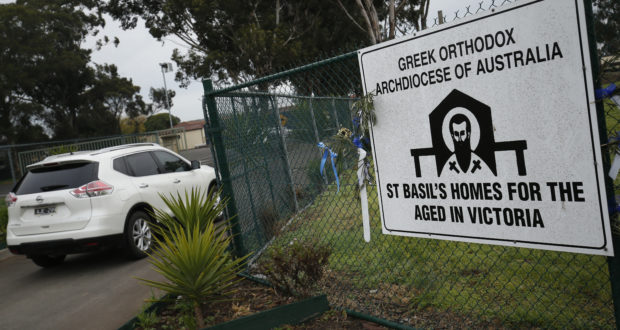A Melbourne woman believes her mother’s death from the coronavirus outbreak at St. Basil’s aged care facility was a form of “manslaughter”, a court has been told.
Maxine Tsihlakis told a coronial inquest into the deaths of 50 residents at the facility that she believed her mum Georgia Mitsinikos’ death was a form of “manslaughter”.
Her 87-year-old mum died in hospital from coronavirus on July 23, three days after Tsihlakis was told she had tested negative to the highly contagious disease.
“No Maxine, if your mother is positive staff will contact you. Georgia is negative at this stage,” facility manager Vicky Kos told her in an email read out in court.
Tsihlakis was also frustrated staff members were still working when they tested positive to coronavirus.
“Why are these people are still working here? They should have been home,” she said.
Tsihlakis told the court she was disappointed with the care her mother received at the facility before the pandemic.
Mitsinikos moved into St Basil’s after a van struck her in 2018 and left her with injuries.
Staff were “run off their feet”, Tsihlakis told the court, and she took her mother to a GP after noticing she’d been put on extra medication and discovered they included sedatives.
Tsihlakis told the court she didn’t see staff members wearing masks when she and her brother visited their mum during the pandemic.
The family picked the facility because there were residents of Greek background and they believed their mum could socialise, Tsihlakis said.
Her evidence came before Victoria’s health department director of human services and public health policy Naveen Tenneti offered his sympathy to the families of victims.
Dr Tenneti told the Coroners Court he was involved in “nearly every significant case or outbreak” in the state.
“All those decisions weigh on me, just as every patient I treated in a clinical setting weigh on me,” he said.
“That weight obviously can’t match the experience of a loved one and I express my deep sympathies to them.”
He was also probed about the decision to stand down St. Basil’s staff and replace them with agency workers, and concerns over the potential neglect of patients.
The decision was a balancing act of whether it was riskier to allow staff to be “incubating” the virus and spreading it to others as well as the potential issues with continuity of care for residents and their needs, Dr Tenneti said.
“We weren’t making a decision with the knowledge that there then would be an insufficiently sized or capable workforce replacing them,” the doctor said.
“The very premise of the decision was to conduct this quarantine (of staff), there would be an appropriate handover and hence the workforce that came in and replaced would be able to exercise and manage any care needs.”
It was an “incredibly difficult” decision, he said.
The doctor told the court he couldn’t recall whether he specifically mentioned neglect in any meetings but it could be an outcome in some settings.
The inquest resumes in front of State Coroner John Cain on Monday.
Do you have an idea for a story?Email [email protected]
 Aged Care Insite Australia's number one aged care news source
Aged Care Insite Australia's number one aged care news source

